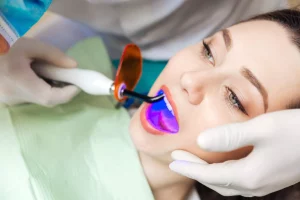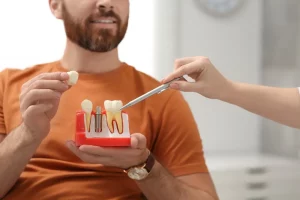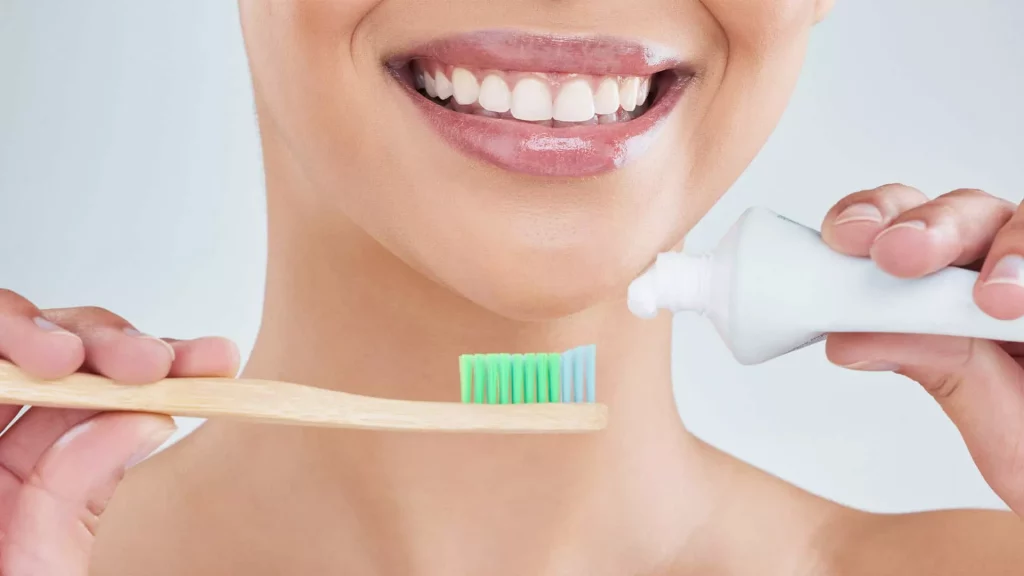Last Updated on: 12th December 2025, 08:13 am
A tooth extraction is recommended when a dentist needs to remove a tooth that cannot be saved. It is done when a tooth is badly damaged, infected, or causing problems like pressure or overcrowding. It can be done at Channel Islands Family Dental in Oxnard, Newbury Park, Ventura, Santa Paula, and Port Hueneme where we ensure that every patient receives expert care, clear guidance, and personalized aftercare to protect their smile.
Tooth extraction may sound scary, but it should be considered when your tooth cannot be saved using other methods.
While dentists always try to preserve natural teeth, there are times where removing a tooth is the safest choice. If your dentist recommends an extraction, it is because keeping that tooth might cause a more serious problem later.
Tooth extraction is not the end of the process. After a tooth is removed, the next step is healing before replacing the missing tooth. This procedure helps you stay healthy and keeps your mouth working normally.
Table of Contents
ToggleWhat is tooth extraction?
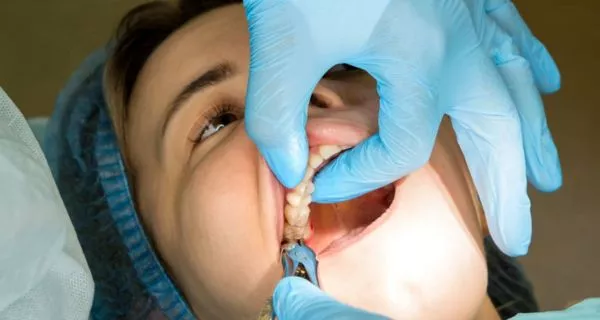
A tooth extraction is a dental procedure where a dentist removes a tooth from its socket in the bone. It is also called dental extraction or tooth removal.
Dentists only recommend this procedure when it is really necessary and no other option can save the tooth.
How is the tooth extraction done?
The main steps of a tooth extraction:
- dental exam with a dentist
- X-ray to check the tooth and the surrounding bone
- local anesthesia to numb the area
- loosening and gently removing the tooth
- cleaning and packing the socket to control bleeding
Is tooth extraction painful?
Many people become afraid when they hear the word “extraction” as they think it will be painful. But with modern dentistry, the procedure is safe, quick, and almost painless. Here is why:
- Local anesthesia: The dentist uses medicine to numb the area. You will not feel sharp pain, only pressure or movement.
- Quick procedure: A skilled dentist can remove a tooth in a short time.
- Fast relief: If the tooth was infected, broken, or causing severe pain, most patients feel much better right after the extraction.
At Channel Islands Family Dental, our dentists use modern tools, advanced anesthetics, and a gentle approach. This means you can relax during treatment, knowing that the procedure will not hurt and you will feel relief quickly.
Why is tooth extraction sometimes necessary?
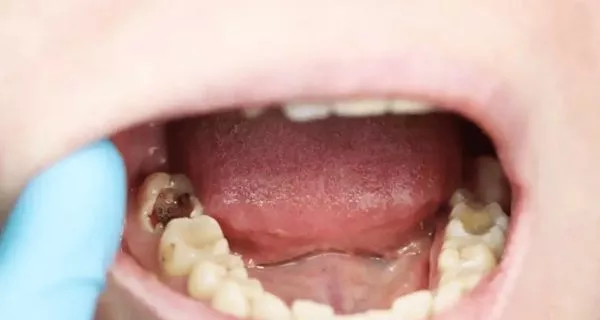
Dentists try to save natural teeth first, since a healthy tooth is stronger than a replacement. However, sometimes, extraction is the safest solution.
Common reasons for extraction include:
- Severe decay or large cavity: when the tooth cannot be fixed with a filling or crown.
- Gum (periodontal) disease: if the tooth becomes loose and cannot be saved.
- Impacted or misaligned teeth: such as wisdom teeth that do not come out properly.
- Fractured or cracked teeth: when the break is very deep and the tooth cannot be rebuilt.
- Overcrowding: teeth may need to be removed to make space for braces or other orthodontic treatment.
- Cysts or infections: if there is pus, swelling, or a cyst around the tooth or jawbone.
Each case is different. Your dentist will check your mouth carefully before deciding.
A dentist may first try other treatments, such as a filling or root canal, to save the tooth. But if the tooth is too damaged, these treatments have a high chance of failing. When this happens, tooth extraction becomes the safest option to protect your mouth and overall health.
What are the possible complications of tooth extraction?
Just as with any medical or dental procedure, tooth extraction carries some risks. Most patients recover without problems, but it is important to know what can happen. With proper care, however, the chances of serious complications are very low.
What complications can happen during tooth extraction?
- Light bleeding: Some bleeding is normal while the dentist works.
- Difficult roots or broken crowns: Teeth with curved roots or damaged crowns may take longer to remove.
- Nerve or sinus injury (rare): In some cases, nearby nerves or the maxillary sinus may be affected, but this is uncommon.
What complications can happen after tooth extraction?
- Bleeding: Small amounts of blood for the first 24 hours are normal. Using gauze helps control it.
- Swelling and soreness: This usually lasts 2–3 days and improves with rest and ice packs.
- Bruising: Some patients notice bruising on the gums or outer jaw, which goes away in a few days.
- Dry socket (alveolitis): If the blood clot is lost too early, it can cause strong pain and delayed healing.
- Infection: Rare, but possible if bacteria have entered the wound. Following your dentist’s instructions reduces this risk.
Most of these effects are temporary and improve within a week. By following your dentist’s aftercare advice, you will heal well and avoid serious complications.
When should you contact your dentist after an extraction?

Most extractions heal without problems. But you should call your dentist if you notice:
- bleeding that continues after 24 hours.
- severe or increasing pain.
- swelling that does not improve after a few days.
- signs of infection such as fever, pus, or bad odor.
Contacting your dentist promptly ensures a safe recovery and prevents serious issues.
What are the best tips after a tooth extraction?
Healing well after extraction is very important. Good care helps your mouth recover faster and prevents problems.
What hygiene tips help after tooth extraction?

- Control bleeding: Bite gently on a piece of gauze for 15–20 minutes.
- Keep the area clean: Brush your other teeth carefully, but avoid brushing directly on the extraction site for the first day.
- Be gentle when rinsing: Do not rinse strongly; this can move the blood clot. Use mild salt water after 24 hours if your dentist recommends it.
What habits help you heal better?
- Reduce swelling: Use a cold pack or ice wrapped in cloth on your face during the first 24 hours.
- Take medicine: Use painkillers or anti-inflammatories prescribed by the dentist.
- Eat soft foods: Choose soups, yogurt, smoothies, or mashed potatoes. Avoid hard, hot, or spicy foods.
- Protect the area: Do not chew on the side where the tooth was removed for 24–48 hours.
- Do not smoke: Smoking slows healing and increases the risk of dry socket.
By following these hygiene and habit tips, your recovery will be smoother, safer, and more comfortable.
What are the next steps after tooth extraction?
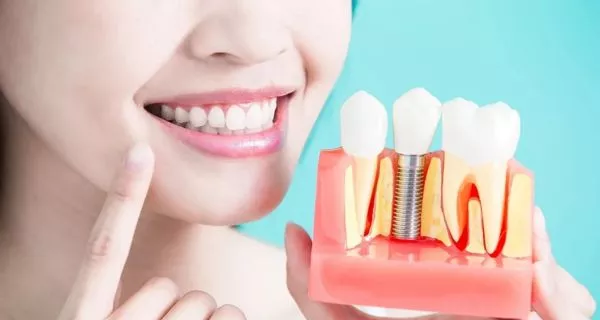
Removing a tooth is only the first step. Proper follow-up care and replacement of the missing tooth are essential for long-term oral health. If a missing tooth is not replaced, other problems may appear over time.
What happens if you do not replace the tooth?
- Shifting teeth: Neighboring teeth can move into the empty space, causing a bite problem.
- Harder to clean: Gaps collect food and bacteria, increasing the risk of cavities and gum disease.
- Bone loss: The jawbone where the tooth was removed begins to shrink, which can affect facial structure and the stability of the other teeth.
What are the options for replacing missing teeth?
- Dental implants: strong and long-lasting, replacing both the root and the crown of the tooth.
- Dental bridges: fixed replacements supported by nearby teeth.
- Partial or complete dentures: removable solutions for replacing one or several teeth.
Replacing missing teeth is important not just for the sake of appearance but also for chewing, speaking, and maintaining overall oral health.
Note: Wisdom teeth usually do not need replacement. They are the last to erupt and are not essential for chewing or appearance.
Is tooth extraction the final solution for pain?
Tooth extraction is often the fastest way to stop severe pain caused by deep cavities, infection, or pressure from impacted teeth. While pain relief is usually immediate, complete comfort is achieved once the area has healed fully.
With proper aftercare, extraction is a safe and simple solution. At Channel Islands Family Dental, we are here to help with early diagnosis, expert treatment, and personalized attention.
Visit us in Oxnard, Newbury Park, Ventura, Santa Paula, or Port Hueneme, and let us protect your smile and your oral health.
Frequently Asked Questions (FAQ)
Older adults may have slower healing or a higher risk of complications if they have medical conditions like diabetes or take blood-thinning medications. Dentists adjust the care to ensure safety.
Voice Search Snippets (Q&A)
References
1. Cleveland Clinic. (2025, August 18). Tooth extraction. Cleveland Clinic. https://my.clevelandclinic.org/health/treatments/22120-tooth-extraction
2. Dignam, P., Elshafey, M., Jeganathan, A., Foo, M., Park, J. S., & Ratnaweera, M. (2024). Prevalence and Factors Influencing Post-Operative Complications following Tooth Extraction: A Narrative Review. International Journal of Dentistry, 2024, 1–15. https://doi.org/10.1155/2024/7712829
3. Dunkin, M. A. (2023, March 30). Pulling a tooth (Tooth extraction). WebMD. https://www.webmd.com/oral-health/pulling-a-tooth-tooth-extraction
4. Gadhia, A., & Pepper, T. (2023, June 1). Oral surgery, extraction of teeth. StatPearls. NCBI Bookshelf. https://www.ncbi.nlm.nih.gov/books/NBK589654/
5. Jogezai, U., & Kalsi, A. (2024). Long-term complications and management of dental trauma in the adult patient – Part 1: fractured teeth, pulpal complications and resorption. BDJ, 237(2), 95–105. https://doi.org/10.1038/s41415-024-7641-z







